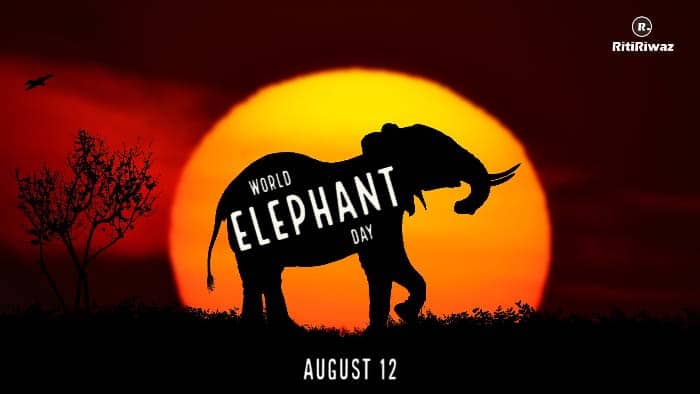World Elephant Day – August 12

World Elephant Day is observed on August 12, in support of the protection and preservation of elephants. The main objective of celebrating this day is to create awareness about the urgent plight of African and Asian Elephants. The Asian Elephant is listed as “Endangered” while the African Elephants are “Threatened”.
This day is marked to educate people on the threats elephants are facing, destroy ivory stockpiles, and urge governments throughout the world to enforce tighter measures against poaching and illegal trade of ivory and other elephant products.
With human development, the dubious nature of wildlife tourism, animal cruelty, and the illegal wildlife trade the Asian and African Elephant species are under threat. According to the estimation received about the elephant population in the year 2017, there are now only four lakh African elephants and forty thousand Asian elephants left in the world.
History
On 12 August 2012, the first International Elephant Day was celebrated. Since then, it is observed annually and this day is dedicated to the huge animal protection and preservation. Michael Clark and Patricia Sima, two filmmakers from Canada and Sivaporn Dardarananda, Secretary-General of the Elephant Reintroduction Foundation in Thailand decided to celebrate World’s Elephant Day in 2011.
Currently, more than 65 wildlife organizations, many individuals, and many countries are supporting this campaign. Project Elephant was launched in India in 1992 to protect elephants. In 2010, the elephant was given the status of ‘National Heritage Animal‘ to highlight the importance of the Asian elephant in the country.
Suggested Read: Indian National Heritage Animal
Project Elephant
The Government of India started the Elephant Project for the Protection of Elephants in February 1992. 16 states of the country have created various elephant conservation areas under this scheme. These states are – Andhra Pradesh, Arunachal Pradesh, Assam, Karnataka, Kerala, Tamil Nadu, Maharashtra, Meghalaya, Nagaland, Odisha, Tripura, Uttarakhand, Uttar Pradesh, West Bengal, Chhattisgarh, Jharkhand.
The major objective of the project is to:
(i) To assist the States to preserve the existing number of elephants and to ensure the long-term survival of the marked number of elephants in natural habitats.
(ii) To provide protection to their habitats and corridors.
(iii) To resolve the issue of duality between humans and elephants.
(iv) To take care of domesticated elephants and their rearing.
(v) Providing protection to elephants from slaughter.
Gaj Mahotsav
The Wildlife Trust of India, along with the International Fund for Animal Welfare, United Nations Environment Program, and the Ministry of Environment, Forest and Climate Change celebrates Four-day long Gaj Mahotsav. The event is held from 12 to 15 August at Indira Gandhi National Centre for The Arts (IGNCA), New Delhi. The event spread over four days covers art, culture, dance, music, film, literature, spirituality, ecology, media, and policy with the elephant theme.
The event is celebrated along the following pre-defined tracks.
-
Gaja Shastra: Dialogues on Elephants and National Policy
-
Gaja Sutra: Unravelling the story of the Indian Elephant
-
Gaja Dharma: Elephants in religious traditions
-
Bala Gaja: The Secret World of Indian elephants
-
Gaja Yatra: A visual representation of 101 elephant journeys
-
Gaja Gamini: Indian Elephants in Cinema
-
Airavata: Elephants in Indian Culture and Heritage
-
Gajotsava: An Evening with Elephants
Suggested Read: International Tiger Day
Interesting facts about an Elephant:

We know them as the largest living land animal on Earth. In a country like India, they hold a significant place in Hindu mythology. Elephants are mentioned in the Vedas and in the epics as ancient as the Mahabharata and the Ramayana and in the other ancient texts of Gajastram and Hastiayurveda. From Airavata; the holy white elephant to Lord Ganesha; the elephant-headed God (perhaps the most loved one) elephants form an integral part of Indian cultures, religions, and folklore.
-
The elephant is a large-sized creature living on land. It is the largest mammal living on land. They form an integral part of our ecosystem.
-
Elephants belong to the family Elephantidae. There are three species of Elephants out which one is Asian (Elephas maximus) and the other two are African; African bush elephant (Loxodonta Africana) and African forest elephant (Loxodonta cyclotis).
-
Asian Elephants are slightly smaller and have smaller rounded ears as compared to African Elephants. Asian Elephants have convex back while African elephants have saddle-shaped back.
-
Elephants possess an incredible memory, and with a highly developed brain, they are considered to be very intelligent creatures. Elephants can feel the smell of water from 12 miles away, and they are aware of the danger before, so they change their direction.
-
Elephants always like to live in herds, their herd is represented by the eldest elephant i.e. the elephant is the symbol of motherhood.
-
Elephants play a deep friendship. Elephants are known to exhibit grief, compassion, and joy and use their trunk to greet each other.
-
The elephant has a gestation period of 22 months, which is the longest among the ground animals.
-
The baby elephant weighs about 105 kg at birth. The elephant usually lives for 50 to 70 years, although the longest lifespan (longevity) elephant has been recorded at 82 years.
-
In 1955, the world’s largest elephant was killed in Angola. This male elephant weighed about 10,900 kg and had a shoulder height of 3.96 m, which is about one meter more than a normal African elephant.
-
Elephant teeth continue to grow throughout life. The teeth of an adult male elephant grow about 18 cm in a year. Elephants have a total of 28 teeth.
-
The best feature of elephants is that they learn very quickly and cooperate fully while teaching.
-
Elephants are very carefree, they like to play in water and mud and do not disturb anyone without reason and that is why children love them too.
World Elephant Day asks people to support various conservation policies to help elephants, including improving enforcement policies to prevent the illegal poaching and trade of ivory, conserving elephant habitats, providing better treatment for captive elephants, and reintroducing some captive elephants into sanctuaries.
Suggested Read: National Animal of India






